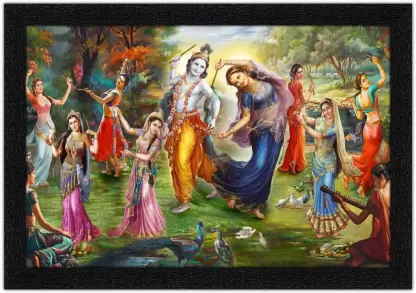Exploring the Divine Love Story of Lord Krishna and the Gopis: A Journey Through the Hindu Mythology
Introduction :
Lord Krishna, one of the most revered deities in Hinduism, is known for his divine teachings, charming personality, and most notably, his love affair with the gopis (milkmaids) of Vrindavan. This captivating love story has been retold and revered for thousands of years and continues to be an integral part of Hindu mythology. In this blog, we will delve into the divine love story of Lord Krishna and the gopis and explore its significance in Hinduism.The Story of Lord Krishna and the Gopis :
According to Hindu mythology, Lord Krishna was born in Mathura to Queen Devaki and King Vasudeva. He was later raised in Gokul by the cowherd Nanda and his wife Yasoda. Krishna spent most of his childhood in Vrindavan, where he grew up among the gopis, playing music and dancing with them. As he grew up, he began to attract the attention of the gopis, who were enamored by his good looks, charming personality, and divine aura.
One of the most famous stories of Lord Krishna and the gopis is the Rasalila, a dance performed by the Lord and the gopis. In this story, Lord Krishna plays his flute and calls out to the gopis, who leave their homes and families to dance with him in the moonlight. The gopis, enchanted by Krishna's music, dance with him all night, expressing their love and devotion to the Lord.
The Significance of the Divine Love Story :
The love story of Lord Krishna and the gopis is not just a romantic tale, but it holds a deep spiritual significance. It is believed that the gopis represent the human soul, and their love for Krishna symbolizes the soul's yearning for the divine. The Rasalila represents the soul's journey toward enlightenment and union with the divine.
The story of Lord Krishna and the gopis also symbolizes the importance of devotion and surrender in Hinduism. The gopis' unwavering love and devotion to Krishna serve as an example of the kind of devotion that is necessary for union with the divine. The story highlights the importance of putting aside one's ego and surrendering oneself to the divine.
In conclusion, the divine love story of Lord Krishna and the gopis is a timeless tale that holds a deep spiritual significance. It is a reminder of the importance of devotion and surrender in Hinduism and serves as an inspiration for spiritual seekers. Whether you are a devotee of Lord Krishna or simply someone interested in Hindu mythology, exploring the story of the divine love affair between Lord Krishna and the gopis is a journey well worth taking.
Rasleela :
The Rasleela, also known as the Raas or the Krishna-Gopi dance, is an integral part of Hindu mythology and is often associated with Lord Krishna and his love affair with the gopis (milkmaids) of Vrindavan. The story of the Rasleela is often portrayed in Hindu art and literature and is considered a symbol of devotion, love, and surrender.
In the story of the Rasleela, Lord Krishna plays his flute and calls out to the gopis, who leave their homes and families to dance with him in the moonlight. The gopis, enchanted by Krishna's music, dance with him all night, expressing their love and devotion to the Lord. The dance symbolizes the soul's journey towards enlightenment and union with the divine and serves as an example of the kind of devotion that is necessary for union with the divine.
The Rasleela is a popular theme in Hindu art and literature and continues to be an important part of Hindu culture and tradition. It is often depicted in paintings, sculptures, and music and is performed as a form of devotional dance in Hindu temples and during religious festivals. Whether you are a devotee of Lord Krishna or simply interested in Hindu mythology, the story of the Rasleela is a fascinating tale that offers insights into Hindu spirituality and devotion.


Comments
Post a Comment